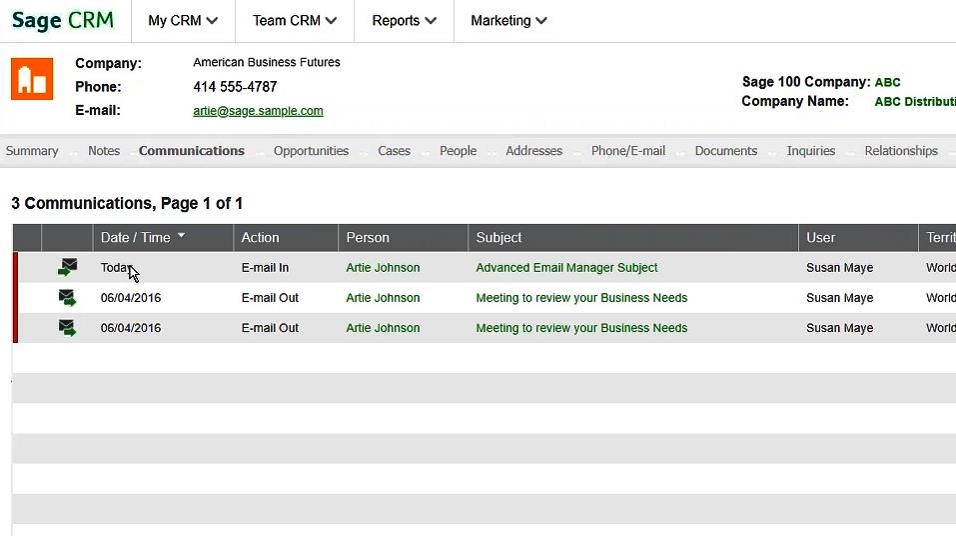4 Reasons to Integrate Your Email with CRM
4 Reasons to Integrate Your Email with CRM
Email integration empowers salespeople
You use email every day. And odds are, you’re already using an application like Microsoft Outlook to manage all those emails. But applications like Outlook don’t just manage your emails: they can also manage your calendar, contacts, tasks, and notes.
These additional information and scheduling features are powerful tools for salespeople. Your time is valuable, and your ability to schedule and communicate effectively and efficiently is critical to your success. After all, if you can’t manage your opportunities, you aren’t likely to win many of them.
That’s why we believe so strongly in the importance of integrating your email with CRM.
“
If you can’t manage your opportunities, you aren’t likely to win many of them.
”
A good CRM system helps you manage your opportunities by giving you a central, shared hub of information, scheduling, and communication. This allows you to maximize the tools you already have to understand and serve your customers better.
You will know more, and you can do more, which means you will win more.
Integrating CRM with business tools like Outlook that you are already using increases the power of those tools. But for various reasons, some salespeople are reluctant to integrate their email with CRM.
In this article, I will answer some of the most common objections to email integration, and then show you what you can accomplish once your email application is integrated with CRM.
Common Objections to Email Integration
Objection 1: “I like my email the way it is.”
We get it. You’ve likely spent years getting to know your email application. You know the ins and outs and strengths and weaknesses of your company’s app of choice. After spending all that time, the last thing you likely want is to see all that comfort and expertise tossed out the window for some new system.
Now for the good news: you won’t have to.
A good CRM integration will augment rather than replace your email application. All the core functionality will remain the same. Your email application will simply share the information you choose to share with CRM.
Objection 2: “Linking email with CRM will just make things more complicated.”
Actually, sharing information with CRM is very simple. For example, when you link Outlook to Dynamics 365 for Sales using the Outlook CRM plugin, a single button in each view allows you to choose which emails, contacts, and calendars to sync with CRM. You control how much information your CRM has access to.
That means that yes, things can get very complicated if you are importing tons of email data to CRM. You can potentially have access to lots of information and lots of analytical tools.
But we see this as a feature, not a bug. None of these capabilities interfere with your day-to-day email use. You don’t have to use them all immediately, and as you get more comfortable and confident with the tools available to you, you can do more with them.
Objection 3: “I don’t want my bosses/coworkers spying on me.”
That’s not what CRM does. And if it’s what your bosses are trying to use it for, you have a much bigger problem than a CRM system!
One of the primary benefits of CRM is improving sales visibility, yes, but you choose what to share with CRM. If an email isn’t relevant, you shouldn’t add it to CRM.
That’s just good practice, whether your concern is maintaining good data or maintaining your privacy. Any good integration (and any good boss!) will recognize this.
The Benefits of Email Integration
Benefit 1: Your scheduling and communication records are centralized and easily accessible.
When you integrate a robust email application like Outlook to a similarly robust CRM system like Microsoft Dynamics 365 for Sales, you will have access to Outlook and CRM data from both programs. That means if you schedule something in Dynamics, you will see it in Outlook, and vice versa.
This reduces the likelihood of creating scheduling conflicts or missing important information, while also saving time by preventing the need to tab back and forth between programs.
Benefit 2: You won’t need to double-enter records anymore.
Once it’s in your integrated system, it’s in there.
Got an email from a prospect? You can add a new account record to CRM directly from your email application.
Sending or receiving an email that you’ve chosen to share with CRM? It will be logged as an activity within the appropriate record.
Scheduling a phone call in one program? It will also appear in the other. You save time and reduce the number of duplicate or conflicting records.
Benefit 3: You can schedule, automate, track, and analyze emails.
Scheduling automated emails, responses, and follow-ups for certain simple or bulk tasks will save you time and energy that you can use elsewhere.
Meanwhile, tracking and analyzing your emails allows you to spot trends in your sales processes. You can make adjustments accordingly to find the formula that works best for your customers and prospects.
Benefit 4: You can create support cases directly from your email.
If you’re building strong relationships with your customers, it’s not uncommon for them to reach out to you for everything rather than contacting support.
The good news is that email integration makes it easy to keep your customers happy by ensuring the right people see those tech questions your customers keep asking you.
You can easily respond to the email to let your customer know you are transferring them to IT. Then, you can create a support case directly from your email.
Once that case is in your CRM system, you won’t have to worry about it falling through the cracks like it might if you were relying on e-mail forwards that can get lost in spam folders or missed in crowded inboxes.
Sell better, faster, and smarter
The more you explore your integrated email and CRM systems, the more tricks you’ll learn, and the more useful and powerful your integration becomes.
And the sooner you start, the sooner you’ll start reaping the rewards of integrated email.
Contact us today to get your email integrated with CRM or to make sure you’re getting the most from your existing email integration!
Why MSP’s Should add CRM to their Solution Portfolios
We’re entering a new era in CRM. All the old reasons for customers buying CRM are still valid. But the advent of AI is making the case for renewed interest in CRM. To modify an adage, “If it’s interesting to my customers, then it is fascinating to me!”. AI is...
Boost Your MSP Earnings with Strategic Partnerships
Time is money, we’ve been told since childhood. The idea is that people should focus their attention on the things that bring value to them, and avoid the things that don’t. Since time is a precious resource, it makes sense to try and maximize its utility as it’s the...
CRM Launch in 5 Weeks – Get Results Fast!
The Growing Importance of CRM CRM is increasingly becoming an essential tool for businesses aiming to stay competitive. Yet, the journey to implementation is often marred by inefficient processes that lead to resource drain without yielding desired results....
4 Key Principles for CRM Success
Implementing CRM successfully is crucial in today’s business landscape, where 40 to 70 percent of projects are reported to fail, leading to significant time and financial losses. This stark reality underscores the importance of approaching implementation with...
Do This to Avoid Wasting Time and Money With Your CRM
CRM as the Backbone of Competitive Advantage Investing in a CRM system can either significantly boost your business or, conversely, fail to meet expectations. Enhancing sales growth, operational efficiency, productivity, customer retention, and responsiveness are...
Adding CRM to Your Solution Offering – Not Just a “Nice to Have”
Many MSP’s hesitate to add non-infrastructure solutions to their offerings. There are a lot of reasons for this: Lack of experience with the solution Fear of losing focus on the vital infrastructure solutions that make up the core offerings Uncertainty over the...
5 Reasons MSP’s Should Care About CRM
Every MSP cares about their customers. Reliability. Trustworthiness. Committed. These are the attributes that MSPs want to reflect back to their customers. In an earlier I post I talked about the pain that many customers are feeling because of a CRM install gone bad....
CRM Made Easy For Partners – The Azamba Difference!
Simplified CRM Every large tech company must have processes to make sales and marketing programs work. You obviously can’t have different ways of doing things all the time, so the need for process is important. But it sure can be tough for partners to navigate. This...
How Microsoft Dynamics 365 CRM is CRUSHING Salesforce
Choosing the right CRM is a pivotal decision for any business, especially for small to medium-sized enterprises seeking to streamline operations and enhance customer relationships. When it comes to selecting between leading CRM solutions like Salesforce and Microsoft...
5 Reasons Why Adding CRM to their Solution Set Makes MSP’s More Successful
2024 will be the year of customer retention. Many are forecasting choppy economic waters ahead so it’s incumbent for Managed Service providers to protect their business. At Azamba, we think that partners have a golden opportunity to increase their margins while...
David Marincic is Partner Experience Manager at Azamba. He also manages and edits Azamba publications and social media channels.
David believes in the importance of good planning, sound practice, effective communication, and continued education in order to get the most from any technology solution.
Related articles:
Why MSP’s Should add CRM to their Solution Portfolios
We’re entering a new era in CRM. All the old reasons for customers buying CRM are still valid. But the advent of AI is making the case for renewed interest in CRM. To modify an adage, “If it’s interesting to my customers, then it is fascinating to me!”. AI is...

Boost Your MSP Earnings with Strategic Partnerships
Time is money, we’ve been told since childhood. The idea is that people should focus their attention on the things that bring value to them, and avoid the things that don’t. Since time is a precious resource, it makes sense to try and maximize its utility as it’s the...



